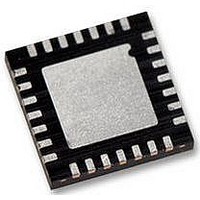PIC16F1827-I/MQ Microchip Technology, PIC16F1827-I/MQ Datasheet - Page 55

PIC16F1827-I/MQ
Manufacturer Part Number
PIC16F1827-I/MQ
Description
IC, 8BIT MCU, PIC16F, 32MHZ, QFN-28
Manufacturer
Microchip Technology
Datasheet
1.PIC16LF1827-ISS.pdf
(400 pages)
Specifications of PIC16F1827-I/MQ
Controller Family/series
PIC16F
Eeprom Memory Size
256Byte
Ram Memory Size
384Byte
Cpu Speed
32MHz
No. Of Timers
5
Interface
EUSART, I2C, SPI
Core Size
8 Bit
Program Memory Size
4 Kwords
Processor Series
PIC16F
Core
PIC
Data Bus Width
8 bit
Program Memory Type
Flash
Data Ram Size
384 B
Interface Type
I2C, SPI, UART
Maximum Clock Frequency
32 MHz
Number Of Programmable I/os
15
Number Of Timers
5
Maximum Operating Temperature
+ 85 C
Mounting Style
SMD/SMT
Package / Case
QFN EP
3rd Party Development Tools
52715-96, 52716-328, 52717-734
Development Tools By Supplier
PG164130, DV164035, DV244005, DV164005
Minimum Operating Temperature
- 40 C
On-chip Adc
10 bit, 12 Channel
Lead Free Status / Rohs Status
Details
- Current page: 55 of 400
- Download datasheet (7Mb)
5.0
5.1
The oscillator module has a wide variety of clock
sources and selection features that allow it to be used
in a wide range of applications while maximizing perfor-
mance and minimizing power consumption. Figure 5-1
illustrates a block diagram of the oscillator module.
Clock sources can be supplied from external oscillators,
quartz crystal resonators, ceramic resonators and
Resistor-Capacitor (RC) circuits. In addition, the system
clock source can be supplied from one of two internal
oscillators and PLL circuits, with a choice of speeds
selectable via software. Additional clock features
include:
• Selectable system clock source between external
• Two-Speed Start-up mode, which minimizes
• Fail-Safe Clock Monitor (FSCM) designed to
• Oscillator Start-up Timer (OST) ensures stability
FIGURE 5-1:
© 2009 Microchip Technology Inc.
or internal sources via software.
latency between external oscillator start-up and
code execution.
detect a failure of the external clock source (LP,
XT, HS, EC or RC modes) and switch
automatically to the internal oscillator.
of crystal oscillator sources
T1OSO
T1OSI
OSC2
OSC1
OSCILLATOR MODULE (WITH
FAIL-SAFE CLOCK MONITOR)
Overview
Oscillator
Oscillator
External
Oscillator
500 kHz
Internal
Source
Source
HFPLL
31 kHz
Block
SIMPLIFIED PIC
Timer1
T1OSCEN
Enable
Oscillator
Sleep
(HFINTOSC)
(MFINTOSC)
31 kHz (LFINTOSC)
16 MHz
500 kHz
®
MCU CLOCK SOURCE BLOCK DIAGRAM
Preliminary
31.25 kHz
FOSC<2:0> = 100
62.5 kHz
125 kHz
500 kHz
250 kHz
16 MHz
8 MHz
4 MHz
2 MHz
1 MHz
31 kHz
IRCF<3:0>
The oscillator module can be configured in one of six
clock modes.
1.
2.
3.
4.
5.
6.
Clock Source modes are selected by the FOSC<2:0>
bits in the Configuration Word 1. The FOSC bits
determine the type of oscillator that will be used when
the device is first powered.
The EC clock mode relies on an external logic level
signal as the device clock source. The LP, XT, and HS
clock modes require an external crystal or resonator to
be connected to the device. Each mode is optimized for
a different frequency range. The RC clock mode
requires an external resistor and capacitor to set the
oscillator frequency.
The INTOSC internal oscillator block produces low,
medium, and high frequency clock sources, designated
LFINTOSC,
Internal Oscillator Block, Figure 5-1). A wide selection
of device clock frequencies may be derived from these
three clock sources.
EC – External clock.
LP – 32 kHz Low-Power Crystal mode.
XT – Medium Gain Crystal or Ceramic Resonator
Oscillator mode.
HS – High Gain Crystal or Ceramic Resonator
mode.
RC – External Resistor-Capacitor (RC).
INTOSC – Internal oscillator.
4 x PLL
PIC16F/LF1826/27
LP, XT, HS, RC, EC
Two-Speed Start-up and other modules
Internal Oscillator
WDT, PWRT, Fail-Safe Clock Monitor
MFINTOSC,
FOSC<2:0>
T1OSC
Clock Source Option
for other modules
Control
Clock
and
SCS<1:0>
Sleep
HFINTOSC.
DS41391B-page 55
Peripherals
CPU and
(see
Related parts for PIC16F1827-I/MQ
Image
Part Number
Description
Manufacturer
Datasheet
Request
R

Part Number:
Description:
IC, 8BIT MCU, PIC16F, 32MHZ, SOIC-18
Manufacturer:
Microchip Technology
Datasheet:

Part Number:
Description:
IC, 8BIT MCU, PIC16F, 32MHZ, SSOP-20
Manufacturer:
Microchip Technology
Datasheet:

Part Number:
Description:
IC, 8BIT MCU, PIC16F, 32MHZ, DIP-18
Manufacturer:
Microchip Technology
Datasheet:

Part Number:
Description:
IC, 8BIT MCU, PIC16F, 32MHZ, QFN-28
Manufacturer:
Microchip Technology
Datasheet:

Part Number:
Description:
IC, 8BIT MCU, PIC16F, 32MHZ, QFN-28
Manufacturer:
Microchip Technology
Datasheet:

Part Number:
Description:
IC, 8BIT MCU, PIC16F, 32MHZ, QFN-28
Manufacturer:
Microchip Technology
Datasheet:

Part Number:
Description:
IC, 8BIT MCU, PIC16F, 32MHZ, SSOP-20
Manufacturer:
Microchip Technology
Datasheet:

Part Number:
Description:
IC, 8BIT MCU, PIC16F, 20MHZ, DIP-40
Manufacturer:
Microchip Technology
Datasheet:

Part Number:
Description:
IC, 8BIT MCU, PIC16F, 20MHZ, MQFP-44
Manufacturer:
Microchip Technology
Datasheet:

Part Number:
Description:
IC, 8BIT MCU, PIC16F, 20MHZ, QFN-20
Manufacturer:
Microchip Technology
Datasheet:

Part Number:
Description:
IC, 8BIT MCU, PIC16F, 32MHZ, QFN-28
Manufacturer:
Microchip Technology
Datasheet:

Part Number:
Description:
MCU 14KB FLASH 768B RAM 64-TQFP
Manufacturer:
Microchip Technology
Datasheet:

Part Number:
Description:
7 KB Flash, 384 Bytes RAM, 32 MHz Int. Osc, 16 I/0, Enhanced Mid Range Core, Low
Manufacturer:
Microchip Technology

Part Number:
Description:
14KB Flash, 512B RAM, 256B EEPROM, LCD, 1.8-5.5V 40 UQFN 5x5x0.5mm TUBE
Manufacturer:
Microchip Technology
Datasheet:

Part Number:
Description:
14KB Flash, 512B RAM, 256B EEPROM, LCD, 1.8-5.5V 40 UQFN 5x5x0.5mm TUBE
Manufacturer:
Microchip Technology










